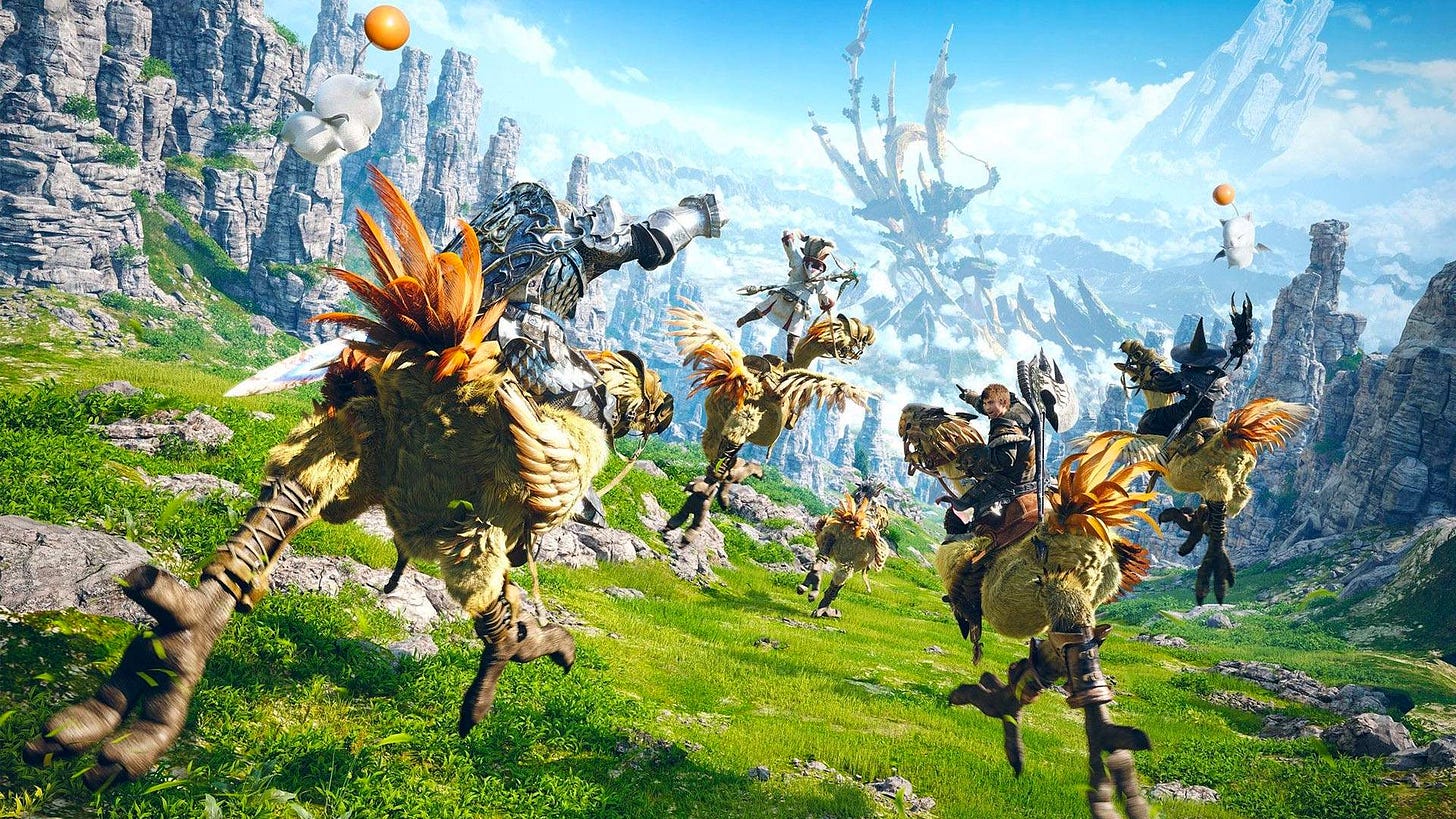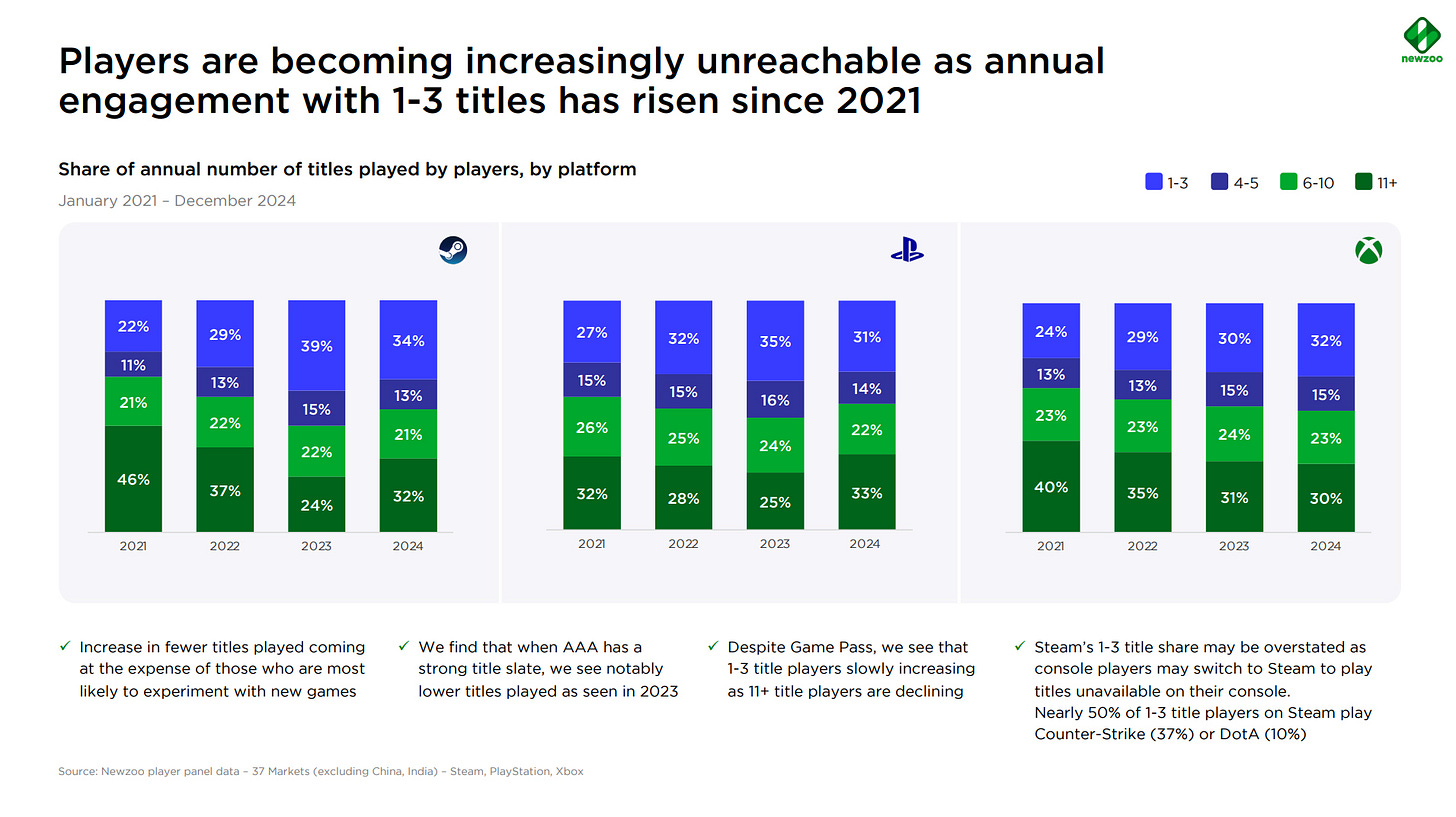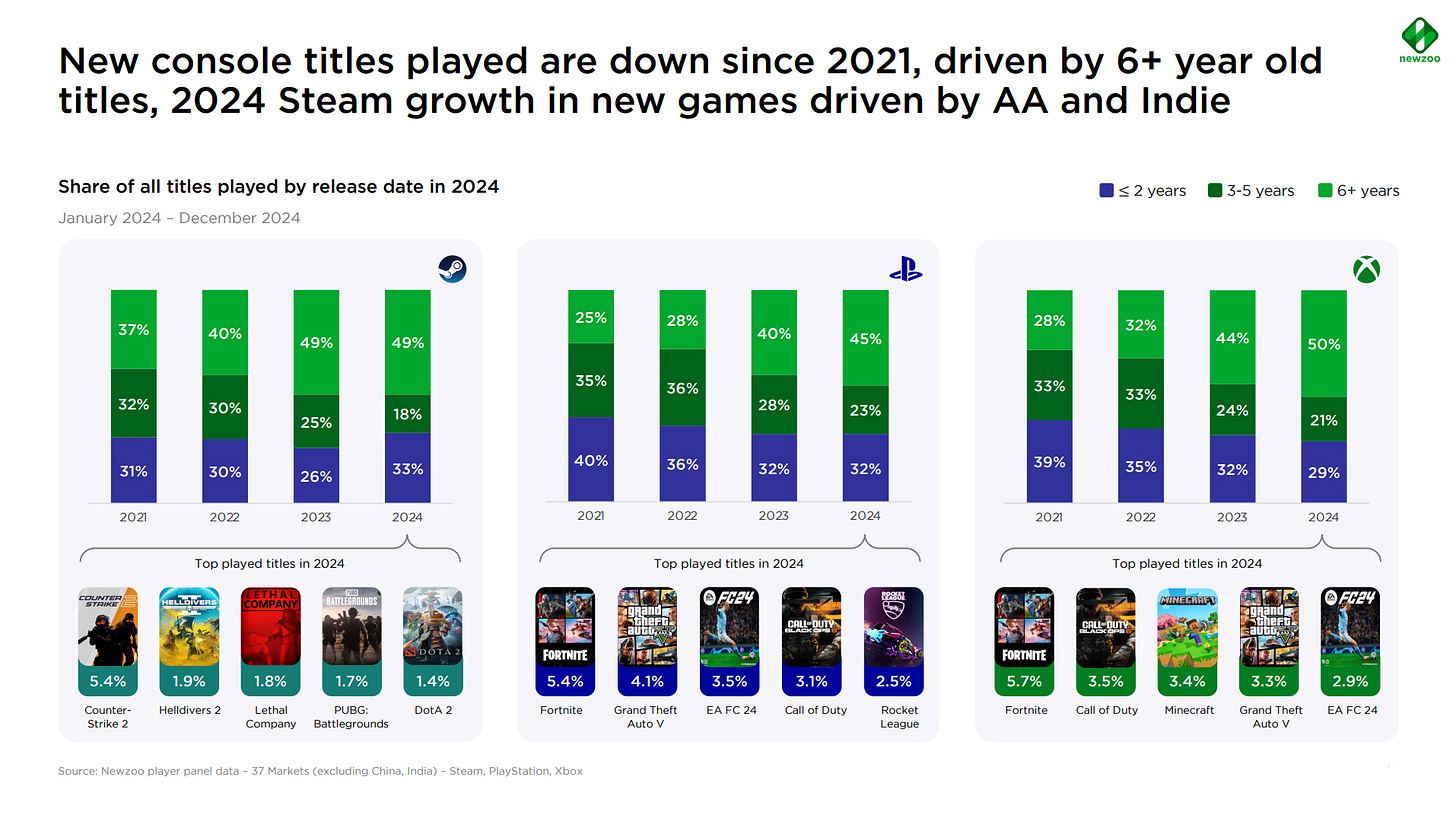Gamers Aren't Real
Half of all console owners only play a handful of titles per year. Is the term "gamers" really appropriate to describe these people?
Last week's article about those turbo-viral Minecraft Civilization videos was unusually popular. If you'll indulge me, there's a leftover rabbit hole connected to that piece that I'd like to explore.
It starts with a comment by Ish, the director of those videos, which surprised me. I had mentioned that I first heard about his video because of a tweet from the communications director on Palworld. And when I asked Ish about that game, he said "uhh.. I've heard of it."
Mind you, Palworld was the biggest breakout hit PC game last year, selling something like 17 million copies on Steam alone, so I was kind of surprised by this answer. How could he not know about Palworld? Later in the call I brought it up again, and asked whether he’d consider himself a “gamer.” He hesitated. "I play one game other than Minecraft for fun," he said, "And that's Clash of Clans. I log on like once a day. That's my one consistent game."
Ish went on to add that occasionally he plays multiplayer games like Peak and Phasmophobia—the sorts of games that are quick and easy to drop into with friends. Our conversation moved on, back to Minecraft.
If I tell you I know a guy who's 23 years old and who earns his living making videos about Minecraft, you would probably say: that's a gamer. But like… if that guy only plays two games… is he? I wonder if the term "gamer," with all the stench of Cheetos dust and shame it has accrued over the years, will be a term that anyone—particularly younger generations—continue to use to describe themselves in years going forward.
The idea of a gamer as a descriptive identity category was first embraced by video game magazines back in the 80s, themselves poaching a term from the tabletop wargaming community. By the 90s and 2000s, the term had crept into advertisements and mass media. After the cultural firestorm of Gamergate in the 2010s, there was a brief and tortured attempt by large tech and media companies to rehabilitate the term and make it more inclusive with advertising campaigns declaring “We’re all gamers.”
This led some to embrace the term ironically, defanging its many ridiculous connotations with a smirk and a half-cocked eyebrow. Watch how these Counter-Strike tournament casters react to an overwrought Intel advertisement about gaming inclusivity:
Maybe gamer has simply aged out of usefulness, soured by associations accrued over time. But there’s also data to suggest that players’ habits are shifting away from omnivorous consumption. Earlier this year Newzoo put out some data showing that the number of games played per year is dropping across basically every platform.
On Xbox and Steam in particular, the proportion of players who only play 1-3 games per year has been growing, while the share of those who play more than 11 games per year has been consistently shrinking. One obvious explanation for this is a phenomenon I covered here last year: old games are killing new games.
That is, people are mostly playing games released in last decade:
The data's helpful, but in this case I honestly think the anecdotal evidence might be more relevant. Don't we all already know that most people only play a few games per year? I know two different guys who literally only play Final Fantasy XIV. Think about how incredibly specific that is. There are millions more like them.
And let's not forget the normies: the people who'll spend $500 on a PS5, and another $80 on the new Grand Theft Auto or FIFA or Call of Duty, but who would otherwise never self-identify as gamers. The same goes for the next generation of kids who play Roblox and Minecraft and nothing else. Calling these people "gamers" is like calling a diehard season ticket holder for the Cleveland Browns a "sports fan." Sure, it’s technically accurate, but such a person has nothing in common with a tennis buff, or a hockey guy. The terminology is not specific enough to function as a meaningful descriptor, and it implies familial or spiritual bonds with others that don’t actually exist.
There will always be many people who play lots of games, people who are interested in games as a category. I count myself among this group. I probably play 25 games per year, mostly indie PC games (especially on flights when I pack my Steam Deck) and Nintendo Switch games during game nights with my kids.
But even I—a guy who writes a weekly newsletter about video games—am hesitant to make my gaming habits part of my identity with a label like "gamer." My wife and I probably watch 25 movies per year on streaming services, but are we "moviers?" Not really. It's not important on the level of our identities. And besides—everybody watches movies. Increasingly, the same can be said for games.
In the Kurt Vonnegut novel Cat's Cradle, the author introduces the idea of a granfalloon: a sort of a false grouping of unrelated people, "meaningless in terms of the ways God gets things done." In the book, two characters discover that they're both Hoosiers—people from Indiana. One declares that she and her husband have "been around the world twice, and everywhere we go we found Hoosiers in charge of everything." She lists out a bunch of important Hoosiers: a hotel manager, an editor of Life magazine, an Ambassador to Yugoslavia. And the gag, of course, is that none of these people owe any of their supposed success to their origins in Indiana. This woman's worldview has become bizarrely warped by a word, a slice of conceptual space describing a shared identity that in reality has no explanatory power for the state of the world.
If I could make a prediction, it would be that the term "gamer" will slowly fade away, clung to by only a small minority of the generation that grew on the forums and subreddits that served as focal points for 2000s and 2010s gaming culture. The next wave of players are so native to games that they see nothing particularly special about their own engagement with the medium. They are fish, and games are in the water. Partaking in games no longer merits some special act of identification.
But people are always and everywhere desperate for words, tools, and symbols by which they can define themselves. When an old label loses its usefulness, that’s when the search for new, more specific identities begins.
That’s it for this week. I’m gonna go play the 5th re-release of Final Fantasy Tactics.







Surprised to never see this come up in these discussions (which I’ve seen a few of now) but Leigh Alexander wrote a polemical version of this post in then-Gamasutra (I think?) and it basically kicked off Gamergate. Now it’s basically conventional wisdom.
What about twitch streamers who play new releases all year? I'd consider them gamers and as long as they're around I don't think the identity as gamer will disappear.